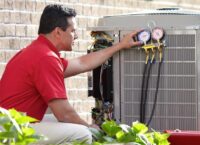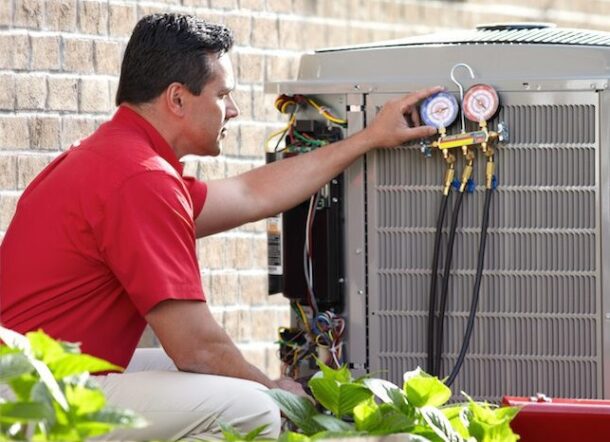When to Call for Emergency AC Assistance If you live in areas like Merrimack, New Hampshire, you know how hot it can get in July and August. The scorching temperatures can make you feel miserable and exhausted. That’s why you rely on your AC unit to keep you cool and comfortable. But what if your Read more
Whats New

When to Call for Emergency AC Assistance
If you live in areas like Merrimack, New Hampshire, you know how hot it can get in July and August. The scorching temperatures can make you feel miserable and exhausted. That’s why you rely on your AC unit to keep you cool and comfortable.
But what if your AC unit stops working or malfunctions? You surely don’t want to endure the sweltering heat or put your well-being and belongings at risk. This is why reaching out for emergency AC repair in Merrimack, NH, the moment you notice any signs of trouble is highly advisable. Here are some signs to look out for if you need urgent assistance.

Signs of urgent AC problems
Some AC problems are minor and can wait until the next business day, but others are more serious and require immediate attention. The following are some signs that you need emergency AC repair:
- Loud or Strange Noises – Squealing, grinding, or banging noises indicate fan belt, compressor, or motor issues.
- Unpleasant Odors: Burning, musty, or rotten smells suggest electrical problems, refrigerant leaks, mold growth, or fire hazards.
- No Cooling or Weak Airflow – Lack of cooling or weak airflow could signal thermostat, blower, refrigerant, or evaporator coil problems.
- Water or Ice Leaks – Leaking water or ice might indicate issues with the condensate drain line, refrigerant line, or evaporator coil.
- Frequent Circuit Breaker Tripping – Repeated circuit breaker tripping could point to wiring, capacitor, compressor, or electrical panel problems.
If you notice these signs, turn off your AC and seek emergency assistance. Avoid DIY fixes to prevent further damage or injury.
Importance of professional emergency AC repair
You may wonder why you need to call for professional emergency AC repair instead of waiting for a regular appointment or trying to do it yourself. Here are some reasons why professional emergency AC repair is important:
- Timely Comfort and Safety – Swift professional repair restores comfort and safety, sparing you from enduring heat and potential hazards.
- Prevent Further Damage – Timely professional intervention prevents escalating issues, saving you from more costly repairs or replacements.
- Efficient Performance – Professional repair ensures your AC works efficiently, reducing energy bills, enhancing indoor air quality, and prolonging your system’s lifespan.
Choosing the right emergency AC service
When you need emergency AC assistance, choose a reliable and reputable service provider that can handle any type of AC problem. These are some tips to help you choose the right emergency AC service:
- Credentials – Verify licenses, insurance, and certifications for emergency AC repair in your area. Online ratings, reviews, and referrals from previous customers offer insights.
- Availability – Prioritize providers offering 24/7 emergency service, ensuring they can promptly reach your location. Confirm availability through their website or customer service.
- Pricing & Warranty – Select those with transparent pricing, providing written estimates before commencing work. Compare quotes from different firms and inquire about their warranty coverage.
Timelines and Deadlines for Renewing Your Medical Marijuana Card in Florida
Conclusion
Knowing when to seek emergency assistance can save you from discomfort and potential health hazards when your AC system faces a sudden malfunction. Recognizing the signs of urgent AC problems is important, and enlisting the expertise of professional technicians is essential for swift and safe repairs.
Remember to choose an emergency AC service with a strong track record, 24/7 availability, and transparent pricing. By taking these steps, you can ensure the longevity of your AC system and enjoy cool comfort even during the hottest days of the year.

A bathroom is more than just a functional space; it’s a sanctuary where you start and end your day. If your bathroom feels outdated or lacks the functionality you desire, it might be time for a professional bathroom remodeling from expert remodelers such as Virginia Shower And Bath. In this comprehensive guide, we’ll explore the Read more
A bathroom is more than just a functional space; it’s a sanctuary where you start and end your day. If your bathroom feels outdated or lacks the functionality you desire, it might be time for a professional bathroom remodeling from expert remodelers such as Virginia Shower And Bath. In this comprehensive guide, we’ll explore the benefits of professional bathroom remodeling, the key steps involved, and how to achieve a harmonious blend of style and functionality in your newly transformed space.

Benefits of Professional Bathroom Remodeling
- Enhanced Aesthetics:
A professional bathroom remodel can breathe new life into your space. With the help of experienced designers and contractors, you can choose a design theme that suits your taste, whether it’s modern, traditional, minimalist, or something entirely unique. The right color scheme, fixtures, and finishes can turn your bathroom into a visual masterpiece.
- Improved Functionality:
Is your current bathroom layout not serving your needs? Professional remodeling allows you to reconfigure the space to maximize functionality. Whether you need more storage, better lighting, or a more efficient layout, a remodel can address these concerns and make your bathroom more user-friendly.
- Increased Home Value:
Investing in a bathroom remodel is an excellent way to increase the value of your home. Potential buyers are often attracted to homes with updated bathrooms, as they signify modernity and attention to detail. A well-executed remodel can provide a significant return on investment when it’s time to sell.
- Energy Efficiency:
Modern bathroom fixtures and technologies are designed with energy efficiency in mind. Upgrading to water-saving toilets, low-flow faucets, and energy-efficient lighting can help reduce your utility bills while minimizing your environmental footprint. A professional remodel can integrate these eco-friendly features seamlessly.
- Health and Safety Improvements:
A bathroom remodel presents an opportunity to enhance the health and safety of the space. Updated ventilation systems can help prevent mold and mildew growth, improving indoor air quality. Additionally, a remodel can incorporate safety features like slip-resistant flooring, well-placed grab bars, and rounded vanity edges to reduce the risk of accidents.
Key Steps in a Professional Bathroom Remodeling Project
- Planning and Design:
The first step in any successful bathroom remodeling project is meticulous planning and design. Work with a professional designer to discuss your vision, needs, and budget. They can help you create a design that balances aesthetics and functionality. Consider factors such as layout, fixtures, materials, and color palette during this phase.
- Budgeting:
Establishing a realistic budget is crucial to ensure the project stays on track. Your budget should encompass all aspects of the remodel, including materials, labor, permits, and contingency funds. An experienced contractor can help you allocate funds appropriately and avoid overspending.
- Demolition and Preparation:
Once the design and budget are finalized, it’s time to prepare the space for remodeling. This involves removing existing fixtures, tiles, and finishes. Proper preparation sets the stage for a smooth remodeling process and prevents unforeseen issues down the line, such as the innovative use of tiles for your commercial space.
- Plumbing and Electrical Work:
Updating plumbing and electrical systems may be necessary to accommodate your new bathroom layout and fixtures. Experienced professionals can ensure that these essential elements are installed correctly and up to code, providing you with a safe and efficient space.
- Fixture Installation:
Installing new fixtures, such as sinks, toilets, faucets, and showers, is a pivotal step in the remodeling process. Choose fixtures that complement your design theme and enhance the functionality of the space. Proper installation is vital to prevent leaks and other issues in the future.
- Flooring and Tiling:
The flooring and tiling you choose can significantly impact the overall look of your bathroom. Whether you opt for elegant porcelain tiles, natural stone, or resilient vinyl, proper installation is crucial for durability and aesthetics. A professional contractor can ensure precise installation, creating a polished finish.
- Finishes and Details:
The finishing touches bring your bathroom design to life. Consider elements such as paint, trim, lighting, and accessories that tie the space together cohesively. Lighting plays a crucial role in setting the ambiance, so choose fixtures that provide both task and mood lighting.
- Quality Assurance and Inspection:
Before completing the project, conduct a thorough inspection to ensure that everything meets your expectations and adheres to building codes. Address any minor issues promptly to avoid future complications.

Achieving Style and Functionality
- Optimize Storage:
Clutter can quickly diminish the visual appeal of your bathroom. Incorporate smart storage solutions, such as built-in shelves, cabinets, and vanity organizers, to keep your space organized and visually pleasing.
- Select Appropriate Fixtures:
When choosing fixtures, consider both style and functionality. Water-saving faucets and toilets not only contribute to sustainability but also reduce utility bills. Select fixtures that align with your design while offering practical benefits.
- Maximize Natural Light:
Natural light can make your bathroom feel more spacious and inviting. If possible, incorporate windows or skylights to bring in sunlight. Privacy concerns can be addressed with frosted glass or window coverings.
- Choose Timeless Materials:
Trends come and go, but timeless materials such as marble, granite, and high-quality ceramics are enduring choices for bathroom surfaces. They exude elegance and can seamlessly blend with various design themes.
- Harmonize Colors and Textures:
A balanced color palette and texture selection can create a harmonious and visually pleasing atmosphere. Coordinate the colors of walls, tiles, and fixtures to achieve a cohesive look.
- Accessibility Considerations:
If you plan to age in place or accommodate individuals with mobility challenges, incorporate accessibility features. This can include grab bars, non-slip flooring, and a walk-in shower with no threshold.
Your Dream Bathroom Awaits
A professional bathroom remodeling project has the power to transform your space into a haven of style and functionality. By following the key steps outlined in this guide and carefully considering design elements, you can achieve a bathroom that not only meets your practical needs but also reflects your personal taste and enhances your overall quality of life. With the guidance of experienced professionals, your dream bathroom is well within reach. Embark on this exciting journey to revitalize your bathroom and elevate your daily routine.
In the dynamic realm of global commerce, the key to efficient logistics and seamless trade lies in leasing the containers that have redefined the movement of goods across oceans and continents. These resilient metal giants have become the backbone of modern trade operations, revolutionizing how businesses transport their products. In recent times, an increasing number Read more
In the dynamic realm of global commerce, the key to efficient logistics and seamless trade lies in leasing the containers that have redefined the movement of goods across oceans and continents. These resilient metal giants have become the backbone of modern trade operations, revolutionizing how businesses transport their products. In recent times, an increasing number of businesses are recognizing the advantages of opting to lease shipping containers rather than committing to ownership. This comprehensive article delves deep into the myriad benefits that stem from leasing the containers, exploring the diverse container types, demystifying the leasing process, and illuminating vital considerations for a well-informed choice.
Advantages of Leasing Shipping Containers
Leasing shipping containers offers several advantages that make it an attractive option for businesses of all sizes.
- Cost-Efficiency: Leasing containers can be more cost-effective than buying them, especially for short-term or seasonal needs. The upfront cost of purchasing containers can be substantial, while leasing allows businesses to allocate resources more efficiently.
- Flexibility: Leasing provides flexibility in terms of container quantity and types. As your business needs change, you can easily adjust the number and sizes of containers leased without the commitment of ownership.
- Maintenance and Repairs: When you lease shipping containers, the responsibility for maintenance and repairs often falls on the leasing company. This saves your business time, effort, and potential repair costs.
- Upgraded Equipment: Leasing enables access to the latest container technology. As the industry evolves, newer container models with improved features become available, and leasing ensures your business stays up-to-date.
- Cash Flow Management: Leasing containers helps preserve your business’s working capital. With lower upfront costs and fixed lease payments, you can allocate resources to other areas of your operation.
Types of Shipping Containers for Lease
Shipping containers come in various sizes and configurations to accommodate different cargo and logistical needs. The most common types include:
- Standard Dry Containers: These are the traditional steel containers used for transporting dry goods. Available in 20-foot and 40-foot lengths, they are suitable for a wide range of cargo types.
- Refrigerated Containers: Also known as reefers, these containers are equipped with temperature control mechanisms, making them ideal for transporting perishable goods like food and pharmaceuticals.
- Open-Top Containers: These containers have removable tops, allowing for easy loading of oversized cargo that wouldn’t fit through standard container doors.
- Flat Rack Containers: Designed for heavy or bulky items, flat racks have collapsible sides that make loading and unloading easier. They are often used for construction equipment and machinery.
- Tank Containers: These specialized containers are designed to transport liquids, gases, and chemicals safely. They come with built-in tanks made of stainless steel.
The Leasing Process
Leasing shipping containers involves several straightforward steps to ensure a smooth transaction:
- Needs Assessment: Determine your specific cargo requirements, including size, type, and quantity of containers needed.
- Research and Comparison: Research reputable container leasing companies and compare their offerings, lease terms, and customer reviews.
- Request a Quote: Reach out to selected leasing companies for quotes based on your requirements. Make sure to clarify any questions or concerns you have regarding lease terms.
- Lease Agreement: Once you’ve chosen a leasing company, carefully review the lease agreement. Pay attention to terms, responsibilities, maintenance, and insurance provisions.
- Delivery and Inspection: The leasing company will deliver the leased containers to your specified location. Thoroughly inspect each container for any damage or issues and document them.
- Lease Duration: Containers can be leased for varying periods, such as short-term, long-term, or even on a month-to-month basis. Choose the lease duration that aligns with your business needs.
- Return Process: At the end of the lease term, the containers will be picked up by the leasing company. Ensure the containers are in the same condition as when they were delivered to avoid any additional charges.
Key Considerations for Container Leasing
When leasing shipping containers, there are essential factors to keep in mind to make an informed decision:
- Leasing Company Reputation: Opt for a reputable leasing company with a track record of reliability and excellent customer service.
- Lease Terms and Conditions: Thoroughly review the lease agreement, including payment terms, responsibilities for maintenance and repairs, and any potential penalties.
- Insurance Coverage: Determine whether the leasing company provides insurance coverage for the leased containers or if you need to arrange separate coverage.
- Container Condition: Inspect the containers before signing the lease agreement and document any existing damage to avoid disputes later.
- Lease Duration: Choose a lease duration that aligns with your business needs and operational timeline.
- Additional Costs: Clarify any potential additional costs, such as delivery fees, pick-up charges, and penalties for exceeding weight limits.
- Customization Options: Inquire about customization options, such as branding or modifications to meet specific cargo requirements.
Container Maintenance and Care
Proper maintenance and care of leased shipping containers are essential to ensure their longevity and optimal performance. Here’s what you need to know:
- Regular Inspection: Conduct routine inspections of leased containers to identify any signs of wear, rust, or damage. Promptly address any issues to prevent them from worsening.
- Cleaning and Sanitization: Keep containers clean and free from debris to prevent contamination of cargo. Proper sanitization is crucial, especially for containers carrying food or sensitive goods.
- Weather Protection: If containers are placed outdoors, consider using weather-resistant coverings or shelters to shield them from harsh environmental conditions that can accelerate wear and tear.
- Rust Prevention: Apply rust-resistant coatings to the container’s exterior and inspect the container’s interior for rust-prone areas. Address rust promptly to prevent it from spreading.
- Door Maintenance: Regularly lubricate container doors and hinges to ensure smooth operation. Properly functioning doors prevent delays during loading and unloading.
Economic and Environmental Impact
Leasing shipping containers not only offers financial advantages but also contributes to sustainable business practices:
- Reduced Capital Outlay: Leasing containers minimizes upfront capital expenditure, freeing up funds for other business investments and growth opportunities.
- Lower Environmental Impact: By leasing containers instead of purchasing new ones, you contribute to the reduction of manufacturing demand, energy consumption, and raw material extraction, thereby lowering your carbon footprint.
- Reuse and Recycle: Leasing encourages the reuse of existing containers, extending their lifespan and reducing the need for new container production. At the end of their useful life, containers can be recycled, further reducing environmental impact.
Scaling Your Container Fleet
As your business expands or undergoes changes, the ability to scale your container fleet becomes crucial:
- Flexible Scaling: Leasing allows you to easily scale your container fleet up or down based on changes in demand, without the constraints of ownership commitments.
- Geographic Expansion: When expanding to new markets or locations, leasing provides the flexibility to acquire containers tailored to specific regional requirements.
- Temporary Projects: For temporary projects or seasonal fluctuations, leasing enables you to quickly acquire additional containers without the need for long-term investments.
Comparing Leasing to Owning
While leasing offers numerous benefits, it’s important to briefly compare it to container ownership:
- Cost Structure: Leasing involves predictable monthly payments, whereas owning containers requires a higher upfront investment and potential maintenance costs.
- Flexibility: Leasing offers greater flexibility to adapt to changing needs, while ownership might lead to underutilized containers during slow periods.
- Maintenance: Leasing often includes maintenance services, saving you time and effort compared to managing maintenance for owned containers.
- Long-Term Commitment: Ownership involves a longer-term commitment, while leasing allows you to adjust your container fleet based on evolving business requirements.
Conclusion
Leasing shipping containers is a strategic decision that can positively impact your business’s efficiency, cost-effectiveness, and sustainability. By understanding the advantages of leasing, the various container types available, the leasing process, and key considerations, you’re equipped to make an informed choice that aligns with your company’s goals. The benefits of cost-efficiency, flexibility, maintenance support, and access to the latest container technology make leasing an attractive option for businesses involved in global trade and logistics. As you embark on your container leasing journey, remember to prioritize proper maintenance, explore environmental benefits, consider scalability, and make thoughtful comparisons between leasing and ownership to ensure the success of your cargo transportation operations.

Navigating the challenging terrain of the contracting business requires more than just skill, it demands dedication, hard work, and a deep sense of business acumen. In the fiercely competitive world of contracting, every decision you make, from the materials you choose to the way you engage with clients, molds your professional image. Let’s delve deeper Read more
Navigating the challenging terrain of the contracting business requires more than just skill, it demands dedication, hard work, and a deep sense of business acumen. In the fiercely competitive world of contracting, every decision you make, from the materials you choose to the way you engage with clients, molds your professional image. Let’s delve deeper into the journey of sculpting a stellar reputation.

1. Deliver Quality Every Time
Quality is holistic; it envelops the entirety of the project’s life cycle. The materials you choose set the foundation. For those in the mechanical domain, integrating premium components from brands like Aquatrol can dramatically curtail potential post-project complications, ensuring consistent customer satisfaction. But materials are just one part of the equation. The best resources can fall short without skilled hands behind them. Thus, ongoing training for your crew guarantees the consistent delivery of unparalleled workmanship. Quality is one of the biggest contributors of word-of-mouth marketing in any business.
2. Effective Communication
Communication is the lifeblood of any project. Initiating projects with clear expectations regarding the scope, budget, and timeline paves the way for smoother execution. And as the project unfolds, timely updates, particularly when facing challenges or delays, keep trust intact. Being open to feedback, welcoming both accolades and areas of improvement, provides avenues to continually refine and elevate the service offered.
3. Transparency And Honesty
Trust, in the contracting arena, is both fragile and invaluable. Clear, upfront pricing, devoid of hidden costs, fosters client trust. When hurdles arise, as they inevitably do, acknowledging them head-on and seeking resolution is more appreciated than evasion. On the flip side, actively seeking and showcasing testimonials from satisfied customers adds another layer of credibility to your service.
4. Networking And Continuous Learning
The construction and contracting world is dynamic, with technologies, methods, and best practices evolving continually. Immersing oneself in industry-specific events, be it seminars, conferences, or workshops, not only imparts knowledge but also provides a platform to forge valuable connections with peers, potential clients, and industry leaders. Such engagements often lead to collaborations, partnerships, and referral opportunities, reinforcing your position in the industry. Moreover, obtaining and renewing certifications not only demonstrates your prowess but also signals your unwavering commitment to excellence and staying updated.
5. Prioritize Safety And Ethics
Safety and ethical practices form the bedrock of a resilient reputation. Regularly conducting safety workshops, drills, and ensuring compliance with the latest safety standards not only protects your crew but also sends a clear message to clients about your meticulousness. In the realm of ethics, it’s tempting to opt for shortcuts for time or cost savings, but these often come at the expense of quality and trust. Upholding a strict ethical code, even when it’s challenging, not only distinguishes you from competitors but ensures that your reputation remains untarnished in the long run.
Crafting a formidable reputation as a contractor is a continuous endeavor. Every project presents an opportunity to reiterate commitment, showcase expertise, and deliver unmatched value. As the sands of time shift and the industry evolves, a steadfast reputation will act as a beacon, drawing clients towards you, secure in the knowledge that they’re partnering with the very best.

In the endless quest for efficiency and innovation, an engineering marvel emerges from the shadows, capturing the attention of industries worldwide: air bearings. But what is this cutting-edge solution, and why is it revolutionizing motion control? Let’s embark on a journey to uncover the secrets of air bearings, a technology that promises to reshape the Read more
In the endless quest for efficiency and innovation, an engineering marvel emerges from the shadows, capturing the attention of industries worldwide: air bearings. But what is this cutting-edge solution, and why is it revolutionizing motion control? Let’s embark on a journey to uncover the secrets of air bearings, a technology that promises to reshape the landscape of mechanical systems.
What are Air Bearings
Air bearings, often referred to as fluid film bearings or aerostatic bearings, operate on a principle that’s both simple and profound. They utilize a thin film of compressed air to create a virtually frictionless surface between two objects. Unlike traditional bearings that rely on physical contact and often suffer from wear and tear, air bearings provide a contact-free motion, delivering unparalleled precision and smoothness.

How Air Bearings Work
Air bearings function by creating a thin cushion of air between the bearing surface and the object it supports. Let’s delve into the mechanics of this unique technology.
The Components of Air Bearings
Air bearings are typically comprised of the following components:
The bearing itself, often made of specialized materials like ceramics or stainless steel.
An air supply, usually a compressor, that provides the necessary pressurized air.
A set of orifices or porous media through which the air is delivered to the bearing surface.
Before listing the specific attributes of these components, let’s understand how they interact with each other in an air bearing system.
Interaction and Coordination
The air compressor forces the air through the orifices or porous media, creating a stable film of air that separates the bearing from the object. This cushion of air is maintained at a consistent thickness, allowing for precise control and minimal friction.
The Operational Principles
Understanding how air bearings work involves recognizing the key principles that govern their operation. Here’s a glimpse into the core mechanics:
Pressure Distribution: The air film’s pressure must be carefully balanced to support the load without allowing contact between surfaces.
Stability and Damping: Proper design ensures that the air film remains stable, and additional damping mechanisms may be used to control vibrations.
Efficiency and Environmental Impact: Air bearings offer increased efficiency and minimal environmental impact due to the absence of lubricants and reduced wear and tear.
These principles collectively contribute to the wide range of applications and benefits that air bearings offer.
Applications and Benefits
From aerospace to manufacturing, air bearings have diverse applications.

Industrial Applications
Whether it’s in the high-tech world of silicon wafer handling or the demanding environment of heavy machinery, air bearings prove to be invaluable. Here’s how:
Semiconductor Manufacturing: Achieving microscopic precision in the handling and processing of semiconductor wafers.
Heavy Machinery: Providing smooth, controlled movement in large equipment where traditional bearings might fail.
To fully grasp the depth of their influence, we must explore their benefits in detail.
Key Advantages
Air bearings offer several key advantages over traditional bearing solutions, setting them apart as a technology of the future:
Frictionless Operation: Elimination of physical contact reduces wear and tear.
Increased Precision: The controlled air film allows for more accurate positioning.
Environmental Friendliness: Lack of lubricants and reduced waste contributes to sustainability.
Cost-Effectiveness: Longer lifespan and reduced maintenance result in overall cost savings.
These compelling features make air bearings an attractive option for numerous applications.
Different Types of Air Bearings
Air bearings are not confined to a single design or operation mode; rather, they encompass a variety of types, each catering to specific needs and applications. Let’s explore the distinct kinds of air bearings and what sets them apart.
Aerostatic Bearings
Aerostatic bearings rely on an external pressure supply to maintain the air film between the bearing surfaces. Their key characteristics include:
Precision: Exceptional control over positioning, particularly beneficial in applications requiring micrometer-level accuracy.
Adaptability: Suitable for various tasks, from machine tools to precision measuring devices.
Common Applications of Aerostatic Bearings
Aerostatic bearings are prevalent in industries where precision and control are paramount:
In semiconductor manufacturing, they enable intricate alignment.
In optical devices, they facilitate high-resolution imaging.
Aerodynamic Bearings
In contrast to aerostatic bearings, aerodynamic bearings generate pressure through the relative motion between the surfaces. This self-acting mechanism has its unique advantages:
Self-Sustaining: They do not rely on external pressure sources, making them more autonomous.
Energy Efficient: By utilizing the motion to generate pressure, they often consume less energy.
Where Aerodynamic Bearings Shine
Aerodynamic bearings are commonly found in applications where the energy efficiency and self-sustaining properties are essential:
In turbo machinery, where high-speed rotation is standard.
In energy-efficient transportation systems, such as magnetic levitation trains.
Hybrid Air Bearings
Hybrid air bearings combine the features of both aerostatic and aerodynamic bearings, offering a versatile solution:
Flexibility: They can function with both external pressure sources and self-generated pressure.
Broad Application Range: Suitable for scenarios demanding both precision and energy efficiency.
The Best of Both Worlds
Hybrid air bearings are employed in contexts that require a balance between precision and energy conservation:
In aerospace applications, where weight and efficiency are equally vital.
In medical devices, offering accurate and smooth operation without compromising on energy consumption.
These diverse types make air bearings a flexible technology capable of catering to a wide array of industrial needs.
Challenges and Considerations in Implementing Air Bearings
While air bearings present a plethora of advantages, they also pose certain challenges and considerations that must be addressed.
Design Complexity
Implementing air bearings can be a complex process that requires intricate design and understanding:
Precise Calibration: The air film’s thickness must be carefully controlled, demanding sophisticated engineering.
Material Selection: The right materials must be chosen to withstand the pressure and environmental conditions.
Cost Considerations
While offering long-term savings, the initial investment in air bearings may be substantial:
High Initial Cost: Sophisticated design and specialized materials can drive up initial expenses.
Maintenance Requirements: Though generally low-maintenance, specialized care may be required in some cases.
Environmental Factors
Environmental factors must be considered to ensure optimal operation:
Air Quality: The quality and purity of the air used can significantly impact performance.
Temperature Control: Temperature variations can affect the air film’s stability and efficiency.
Conclusion: The Future of Motion
Air bearings are more than just an engineering novelty; they represent a profound shift in how motion is controlled and achieved. With their diverse types, wide application range, and unmatched benefits, they hold the key to a new era of precision, efficiency, and sustainability. Yet, like all pioneering technologies, they come with challenges that must be skillfully navigated. In embracing air bearings, industries are not merely adopting a new tool but aligning with a vision of progress that transcends traditional limitations. The journey of air bearings is only just beginning, and the horizons they will explore are boundless.
